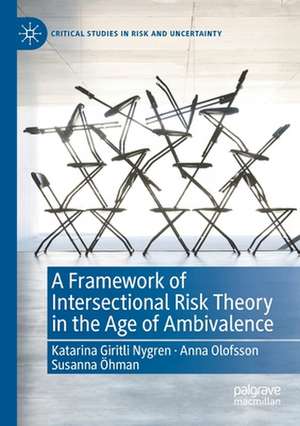A Framework of Intersectional Risk Theory in the Age of Ambivalence: Critical Studies in Risk and Uncertainty
Autor Katarina Giritli Nygren, Anna Olofsson, Susanna Öhmanen Limba Engleză Paperback – 2 ian 2021
The authors purport that risk is pervasive in the Global North, and is fast becoming a hegemonic governing principle. In order to understand this crucial aspect of society, sociological risk theories and risk analysis must go beyond power and social inequalities, to incorporate an intersectional risk approach that takes into account gender, race and other critical perspectives. Their proposed framework will provide the tools to assess how risk is situated in different configurations of power, revealing cracks and openings in the weft of power and rethinking risk governance in contemporary society.
By utilising an intersectional and nuanced analysis, the everyday understanding, practices and discourses of risk can be explored and better understood. This book will be of interest to scholars and students who value the importance of establishing interdisciplinary networks between risk theory, sociology, politics and more in order to study the contemporary world.
| Toate formatele și edițiile | Preț | Express |
|---|---|---|
| Paperback (1) | 578.05 lei 43-57 zile | |
| Springer International Publishing – 2 ian 2021 | 578.05 lei 43-57 zile | |
| Hardback (1) | 586.55 lei 43-57 zile | |
| Springer International Publishing – 2 ian 2020 | 586.55 lei 43-57 zile |
Preț: 578.05 lei
Preț vechi: 680.05 lei
-15% Nou
Puncte Express: 867
Preț estimativ în valută:
110.64€ • 120.23$ • 93.00£
110.64€ • 120.23$ • 93.00£
Carte tipărită la comandă
Livrare economică 21 aprilie-05 mai
Preluare comenzi: 021 569.72.76
Specificații
ISBN-13: 9783030335267
ISBN-10: 3030335267
Pagini: 199
Ilustrații: VIII, 199 p. 1 illus. in color.
Dimensiuni: 148 x 210 mm
Greutate: 0.25 kg
Ediția:1st ed. 2020
Editura: Springer International Publishing
Colecția Palgrave Macmillan
Seria Critical Studies in Risk and Uncertainty
Locul publicării:Cham, Switzerland
ISBN-10: 3030335267
Pagini: 199
Ilustrații: VIII, 199 p. 1 illus. in color.
Dimensiuni: 148 x 210 mm
Greutate: 0.25 kg
Ediția:1st ed. 2020
Editura: Springer International Publishing
Colecția Palgrave Macmillan
Seria Critical Studies in Risk and Uncertainty
Locul publicării:Cham, Switzerland
Cuprins
1. The Age of Ambivalence.- 2. Conceptual Frames: Risk and Intersectionality.- 3. Risk, Inequality, and (Post) Structure: Risks as Governing.- 4. The Performative Aspects of Risk and the Constitution of Subjects.- 5. Doing, Redoing, and Doing Away: Performing Risk.- 6. The Lived Experience of Risk: Multiple Standpoints and Agencies.- 7. Risk Networks: Actors, Actants, and Assemblages.- 8. Methodological Applications.- 9. Risk, Intersectionality, and Ambivalence—A Way to Understand Inequality.- Epilogue: Imagining the Future Differently.
Notă biografică
Katarina Giritli Nygren is Professor of Sociology and the Director of the Forum for Gender Studies, Mid Sweden University, Sweden.
Anna Olofsson is Professor of Sociology at Risk and Crisis Research Centre, Mid Sweden University, Sweden.
Susanna Öhman is Associate Professor of Sociology at Risk and Crisis Research Centre, Mid Sweden University, Sweden.
Anna Olofsson is Professor of Sociology at Risk and Crisis Research Centre, Mid Sweden University, Sweden.
Susanna Öhman is Associate Professor of Sociology at Risk and Crisis Research Centre, Mid Sweden University, Sweden.
Textul de pe ultima copertă
This book brings feminist theories and concepts to the sociology of risk in an attempt to carve out a framework for intersectional risk theories in times of ambivalence.
The authors purport that risk is pervasive in the Global North, and is fast becoming a hegemonic governing principle. In order to understand this crucial aspect of society, sociological risk theories and risk analysis must go beyond power and social inequalities, to incorporate an intersectional risk approach that takes into account gender, race and other critical perspectives. Their proposed framework will provide the tools to assess how risk is situated in different configurations of power, revealing cracks and openings in the weft of power and rethinking risk governance in contemporary society.
By utilising an intersectional and nuanced analysis, the everyday understanding, practices and discourses of risk can be explored and better understood. This book will be of interest to scholars and students who value the importance of establishing interdisciplinary networks between risk theory, sociology, politics and more in order to study the contemporary world.
The authors purport that risk is pervasive in the Global North, and is fast becoming a hegemonic governing principle. In order to understand this crucial aspect of society, sociological risk theories and risk analysis must go beyond power and social inequalities, to incorporate an intersectional risk approach that takes into account gender, race and other critical perspectives. Their proposed framework will provide the tools to assess how risk is situated in different configurations of power, revealing cracks and openings in the weft of power and rethinking risk governance in contemporary society.
By utilising an intersectional and nuanced analysis, the everyday understanding, practices and discourses of risk can be explored and better understood. This book will be of interest to scholars and students who value the importance of establishing interdisciplinary networks between risk theory, sociology, politics and more in order to study the contemporary world.
Caracteristici
Fills a gap in the literature of risk by taking into account class, gender, race, sexual behaviour, and other lines of differentiation and inequality Presents a qualified account of what 'risk society' amounts to in late modern, liberal and pluralist society Contributes a framework that can be applied methodologically in concrete empirical studies









